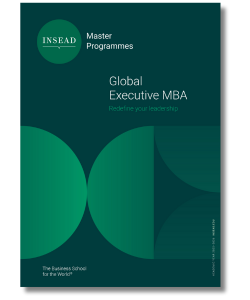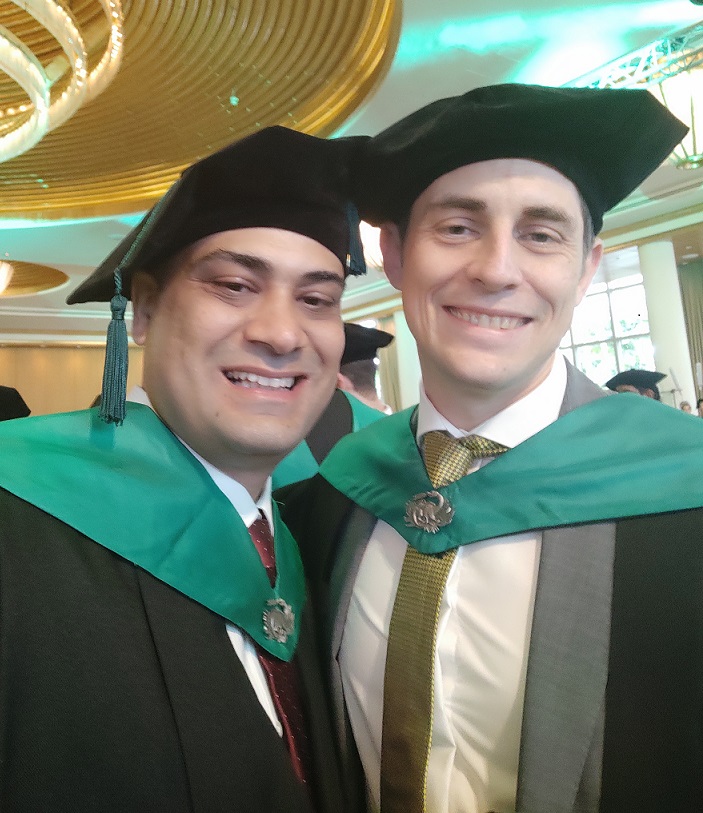By demonstrating the benefits of a traceability solution, two INSEAD MBA graduates are helping set a new industry standard for the textile sector.
Counterfeiting is a colossal problem for the global textile and clothing industry, stealing sales and diluting the hard-fought reputations of major brands. Globally, imports of counterfeit and pirated goods are worth nearly half a trillion US dollars a year, according to the OECD, hitting US, Italian and French manufacturers the hardest.
At the same time, today’s consumers — especially millennials — are growing more conscious of the environmental and ethical footprints their purchases leave behind.
Increasingly, buying decisions are influenced by factors such as how and where items are produced, and under what working conditions.
“It’s very important for consumers now to know they can trust the brand they’re buying from – not only that the goods aren’t counterfeit, but that they have been ethically and sustainably sourced,” says Gernot Salcher, Global Human Resources Director, Corporate Functions and Pulp & Wood at leading Austrian textile company Lenzing Group, and a recent graduate of the INSEAD Global Executive MBA (GEMBA) programme.
Yet while consumer demand for accountability is growing, it can be a big challenge for brands to track their products back to the origin of the fibre.
“The textile industry’s global supply chain networks are usually extremely long, multitiered and fragmented, so it’s really not easy for brands to identify their raw material suppliers,” Salcher points out.
Transforming sustainability in the textile industry through an Executive MBA project
In 2019, Salcher needed to work on his final business project for the GEMBA programme. At this stage, GEMBA participants apply the course content while working on real opportunities for business implementation once the programme is complete.
Salcher turned to his fellow GEMBA participant Behram Irani, now a Business Development Manager at thyssenkrupp Singapore, for support. In collaboration with Lenzing Group and Hong Kong-based technology company TextileGenesis™, the pair came up with an innovative final Executive MBA business project with a focus on sustainability. This project aims to help clothing and textile brands give consumers more confidence in what they’re buying.
Developing a blockchain-based traceability initiative
Together with TextileGenesis™, Irani and Salcher put together a plan for a traceability initiative based on blockchain technology.
Blockchain enables each stage in a production and supply chain to be registered in a scalable, tamper-resistant and permanent universal ledger.
For the INSEAD project, as a specific group of Lenzing-branded raw materials journeyed through the supply chain to become finished garments in retail outlets, stakeholders recorded each stage in the process in a blockchain ledger provided by TextileGenesis™. In this way, they created a unique “chain” of records for each garment.
Ultimately, the finished garments were each given a unique “smart tag” or digital token. Customers could scan the tag on each garment with a smartphone application to instantly access those records, verifying the item’s authenticity and sourcing history.
“We drew on key parts of our GEMBA coursework to put the project together,” says Salcher.
Learning to drive environmentally sustainable impact through INSEAD’s Master Programme
“The ‘Strategy and Impact’ course was especially valuable, as it looks at the application of sustainability concepts as a business driver. That helped us as we considered the impact of our project on the current textile market scenario and how best we could support the UN’s Sustainable Development Goals.”
Other valuable insights came via the ‘Leading Digital Transformation’ course that the pair attended, along with ‘Data Science for Executives.’
“The blockchain basics in the course were really helpful in giving us an understanding of the platform we’d chosen for our project,” confirms Irani.
Lenzing then piloted the initiative under Salcher’s lead with live testing over several months in 2019. “Sustainability is a key part of our company DNA, so we had internal C-suite support for live testing our solution from the start,” Salcher says.
“It was a little trickier to get a critical mass of partner brands on board, as we had to convince them of the project’s business benefits. But once we managed to do that, it all went really successfully. We could execute every part of the pilot as planned.”“It was a highly ambitious project, to be sure – so much so that initially, I was sceptical we’d be able to pull it off,” says Irani.
“What really helped us was the input we got from the INSEAD faculty.”
The pair were guided by Andre Calmon, Assistant Professor of Technology and Operations Management, and fourth-year PhD candidate Philippe Blaettchen, whose research interests include supply chain traceability and blockchain in supply chain management.
“Andre and Phillippe impressed us with the depth of their knowledge and understanding of how similar solutions have been applied in other industries,” Irani says.
“They challenged us with questions we’d never have thought of, helping us get on the right track as we implemented the plan.”
This also significantly supported the industry analysis performed by Irani, unveiling the differences between proclaimed sustainability and real performance.
Applying learnings across industries
Lenzing has now adopted the solution with its TENCEL™ branded fibres. “Our traceability solution is giving us licence to differentiate ourselves – it’s a source of competitive advantage,” points out Salcher. “That’s why we’re now looking to scale the solution more widely. In 2020, we will be carrying out further pilot tests involving other partners along the value chain.”
The innovative project has also scooped the company a top business prize. At the 2019 Corona Business Awards, Lenzing won Gold in the “Digital Corona” category, which recognizes companies that have dynamically advanced the digitalisation of business processes, products, services and business models.
At the same time, the World Economic Forum referred to Lenzing’s blockchain model as it developed its own public traceability platform, which launched in 2020.
Irani, meanwhile, has been tasked with setting up a traceability platform in his own company, giving consumers a way to identify whether the power supplying their homes is from environmentally sustainable resources.
“Even though I’m not working in the textile sector, businesses across most industries now understand that they need to respond to consumer demands for ethical and environmentally friendly products,” he says. “So, what I learned through the Lenzing pilot is highly relevant in my current role as well. I’m certainly finding that INSEAD’s stress on choosing a final business project with real business application has made a significant impact on my career










